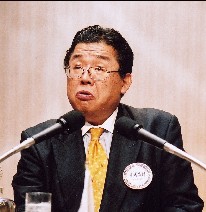Initiation Speech
June 21, 2006
Mr. Shiro Ushio
Mr. Yoshinari Hara
 ��Cinema Complex �� Current State and Toward Digitalization��
��Cinema Complex �� Current State and Toward Digitalization��
Mr. Shiro Ushio,
Director and Corporate Executive Vice President Ushio Inc.
(Definition of Cinema Complex)
��Cinema Complex refers to the movie theatres that have 5 or more theaters within one building.
(Number of Screens in Japan)
��In 1993, when the first cinema complex made its debut in Japan, there were 1734 screens. The number was the lowest in the previous 50 years. Subsequently, it gradually increased each year, and by 2005 there were 2926 screens. During this time, in 2002, the number of screens in cinema complexes represented half of all screens in Japan. In the United States, there are slightly less than 38,000 screens, and movies play an important role in the lives.
(History of Cinema Complex)
��The first cinema complex was opened in 1993 by Warner Mycal Cinemas in Ebina, Kanagawa Prefecture. In the movie industry, where the mainstream location for movie theatres was in front of a railway station, skepticism was abound about locating a theatre in local regional cities and roadsides in suburbs. However, contrary to the market expectations, the number of viewers continued to increase.
(Features of a Cinema Complex)
1. With showings of multiple films at the same location, it widens the choice for the audiences. Depending upon the popularity of the movie, showing the movie in more than one theatre is possible.
2. Seats are arranged in a stadium format, and the seat size is ample. It has state-of-the-art sound systems, and provides excitement not able to be enjoyed at home.
(What is Digital Cinema?)
��This is a system that projects movies without using film. It projects using digital signals. It is also possible to digitally remake classics into 3-D movies.
(Spread of Digital Cinema)
��The digital cinema projector that requires high definition has been slow to spread, and there are only 580 units in North America, 340 in Europe, 280 in Asia, and 1200 in the entire world, with 52 being located in Japan.
(Attempts to Popularize Digital Cinema)
��In the United States, a scheme has been initiated where the cost of film is allocated to capital investment in the theatres, thereby reducing the burden of expense. As a consequence, some results have been seen, and the future success of this scheme is anticipated.
 ��Mission of the Capital Market��
��Mission of the Capital Market��
Mr. Yoshinari Hara,
Chairman of the Board,
Daiwa Securities Group Inc.
��Structural reform championed by the Koizumi government was meant to revitalize the Japanese economy and strengthen corporate competitiveness through the creation of a society and economy centered on corporations which are able to resolve the issues of society, and create a flow of funds ��from savings to investment��. Within the structural reform, in addition to the financial structural reform and elimination of the three major excesses, there was a reform of corporate governance.
����From savings to investment�� depends on vitalizing financial assets held by individuals. This is linked to the revitalization of the capital market, and the roles played by the market participants are important.
��In the policies of ��public sector to the private sector�� also, the privatization of the Japan��s postal services, consolidation of government financial institutions, and the securitization of individual property all involve the capital market. Current structural reform is in progress, and if the next government slackens its pace of reforms, it would not be a positive factor for the capital market or for stock prices.
��The coming 5 years is extremely crucial for the long-term national fiscal policy of Japan. I think that the existence of a fair and deep capital market and sustainable economic growth of the corporations will become the rule of virtue for the resolution of structural issues confronting Japan.
��Recent capital market has suffered the pains of growth in the path of transitioning to a truly fair and advanced market. This is a hurdle that needs to be overcome.
��A capitalist economy, in theory, develops under its own responsibility under free competition. As Max Weber stated, it will not hold up without clean ethical values. In the current amendment to the Commercial Code, in response to the flattening and globalization of the market economy and in order for corporations to enhance their international competitiveness; rules and systems were significantly loosened. In doing this, corporations will need to strengthen their internal controls and develop high ethical values and common sense that do not go against appropriate morals. The sustainable development of the Japanese economy is dependent on the sustainability of the capital market.
The mission and the responsibility of those involved in the capital market are ones that know no bounds.